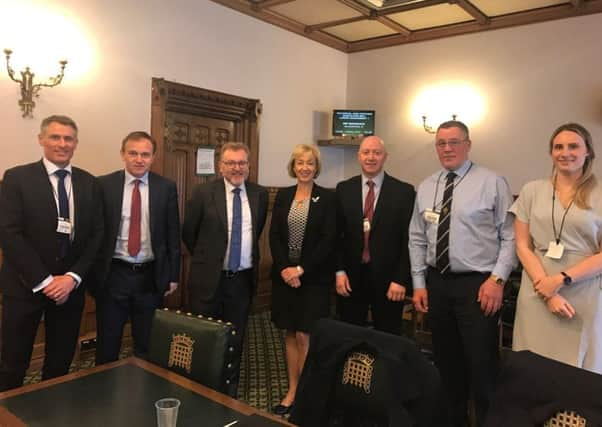Scottish farming leaders hold talks at Westminster
This article contains affiliate links. We may earn a small commission on items purchased through this article, but that does not affect our editorial judgement.


Speaking after the meeting with secretary of state for environment, food and rural affairs Andrea Leadsom, farm minister George Eustice, and secretary of state for Scotland David Mundell, NFU Scotland president Andrew McCornick said that he and his colleagues had stressed the need for long-term funding for the industry to remove current uncertainty.
• READ MORE: Union leaders seek answers on post-Brexit farming
Advertisement
Hide AdAdvertisement
Hide AdHe said: “With a general election now weeks away, all parties will find their records on delivering for Scottish agriculture and the food and drink sectors under scrutiny.
“We continue to press the UK government on the importance of committing to longer-term funding and its fair allocation across the UK.”
He added that such a formula would be key to winning the confidence of Scottish farmers and crofters, and it implied that their needs were being heard in the Brexit negotiations.
McCornick said: “At the meeting, the ministers outlined their vision for farming and food, that it should thrive across all parts of the United Kingdom and that they are committed in their desire to deliver that. We are looking to both Westminster and Holyrood to restore confidence and certainty to all Scotland’s farmers and crofters through agreeing a necessary and meaningful transition.
“The discussion with ministers at Westminster gave us the opportunity to reiterate our position that any successor policy should be funded on a UK-wide common financial framework, but with policy development and delivery kept within the mainstay of the devolved administrations.
“It is concerning that, nearly one month in to the two-year Article 50 process, Scottish farmers and crofters still remain in the dark about how a future agricultural policy will be both delivered and funded in three short years’ time.
“What we need urgently is genuine discussion on the policy instruments and funding mechanisms that will lead to a well-funded, refreshed agricultural policy that delivers for all parts of the UK.”
Advertisement
Hide AdAdvertisement
Hide AdMeanwhile, in evidence to the rural economy committee, Scottish rural affairs secretary Fergus Ewing said that despite his best attempts to enter negotiations with the UK government and garner information on the likely budget for Scottish agriculture, there had been a total lack of the “sort of discussions which would take place in the commercial world”.
He said that in these terms there had been “no negotiations, no dialogue and no commercial agreement” coming from Defra over what the budget would lie.
After he pointed out that the support budget was twice as important to Scottish agriculture than to producers south of the Border, he said: “Prior to the Brexit referendum the UK farm ministers promised that the budget would be at least as much as had come to Scotland through EU funding – and we were told that this was the case ‘without the shadow of a doubt’.
“All we need is for the government to confirm that they will fulfil that commitment”
Pressed by Peter Chapman MSP, a committee member and a former NFU vice-president, as to why the Scottish Government couldn’t move ahead with setting out its own plans, Ewing said: “If I was running a business I would need to know a budget for that business – if I didn’t have that, then I couldn’t possibly make a plan.
“Defra have been given plenty of questions on the funding front as it is a reserved issue, but there have been no answers forthcoming.”